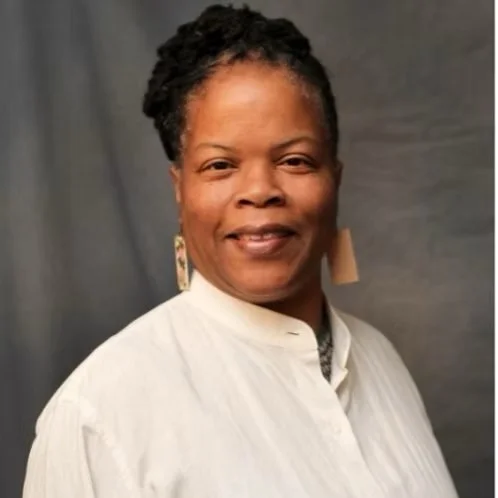Lisa Bratton
Does history have the power to heal and build bridges? Dr. Lisa Bratton has a personal perspective.
Lisa is a historian with a Ph.D. in African American Studies, and a professor at Tuskegee University. She was a 2023 participant in Widen the Circle’s Berlin Fellowship and our ongoing International Bridge Building initiative. Her great-great-grandparents, Green and Malinda Bratton, were enslaved at Brattonsville plantation in York County, South Carolina. The site is now a 775-acre living museum called Historic Brattonsville, complete with docents dressed in period costume. It was home to Col. John Bratton, a Revolutionary War hero.
Despite the site’s connection with her family, Lisa had no interest in attending events there that ignored the experience of her ancestors. “We would get fliers: ‘Come to Historic Brattonsville, learn about Col. Bratton’ — slaveholder — ‘and come learn about the architecture of Brattonsville.’” The flier didn’t mention the enslaved people, nor did it mention J. Rufus Bratton, the family member who brought the Ku Klux Klan to South Carolina and led a notorious lynching of Black militia leader Jim Williams in 1871.
“I said … I’m not going. That doesn’t speak to my experience. I called it happy times on the plantation,” Lisa recalls.
But in 2003, she received an invitation asking Black descendants to visit. She went, and she recalls the event as sterile and stilted, but it was a beginning. A year later, she attended a family reunion along with Congressman John Spratt, a Bratton descendant. “I’m introducing him as Congressman John Spratt, and he’s walking around my whole family reunion, the only white man there, saying ‘Hi cousin, hi cousin.’ I said to myself, OK, I’m going to act like this is normal.”
Because enslaved people were not typically named in census records (until 1870, after the 13th Amendment abolished slavery) and other documentation from the period has been lost, many descendants have not been able to trace their roots to specific plantations. But the University of South Carolina holds 150 years of documents from Brattonsville. Spratt quietly paved the way for Lisa to do research and pursue projects for Historic Brattonsville.
“This work is truly my passion,” she says. “When I go to South Carolina to where the Bratton family papers are, it’s like the best day ever. … I get there when they open and I leave when they close, and I can do that for days at a time.” Lisa has seen papers showing that Malinda was purchased at age 14 and listing her as property of the bride in a prenuptial agreement, and she has seen the first sharecropping agreement Green signed in 1866, for example.
“People ask me, ‘Don’t you get depressed about this work? Aren’t you angry?’ Absolutely not. Green and Malinda Bratton were the first freedmen to purchase land in York County. The land is still in my family.” Enslaved people, she says, were strong; they were survivors. And that should be celebrated. She is currently working on a book about how enslaved people on the plantation resisted that enslavement.
In the last two years, Lisa set up a regular Zoom call with white Bratton descendants. They were enthusiastic, but it took a little persuading for the management of Historic Brattonsville to agree. “I said I’m not interested in name calling. I’m not interested in placing blame…I’m interested in a conversation because we have a shared heritage.”
The calls have been productive, resulting in a project to restore the slave cemetery at the plantation. They are also working on a quilt that they sew only at Brattonsville — white descendants and Black descendants together.
One other thing came out of those calls — a test that shows Lisa shares DNA with the white Brattons. She has struck up a friendship with several of the white descendants. “It’s been a very positive experience for me,” she says. “We’ve become friends and we’ve become family.”
Historic Brattonsville has changed as well, adding much more information about slavery and the people enslaved there, and even about the Klan leader, J. Rufus Bratton. “Brattonsville interprets African-American history well. I give them an A-minus; they really are doing a good job,” Lisa says.
More: Lisa Bratton and two of her cousins, Margaret Willens and Dr. Sarah Spratt, discuss the projects at Historic Brattonsville and how there lives have changed as a result: “We Call Each Other Cousin,” a Widen the Circle online conversation.


